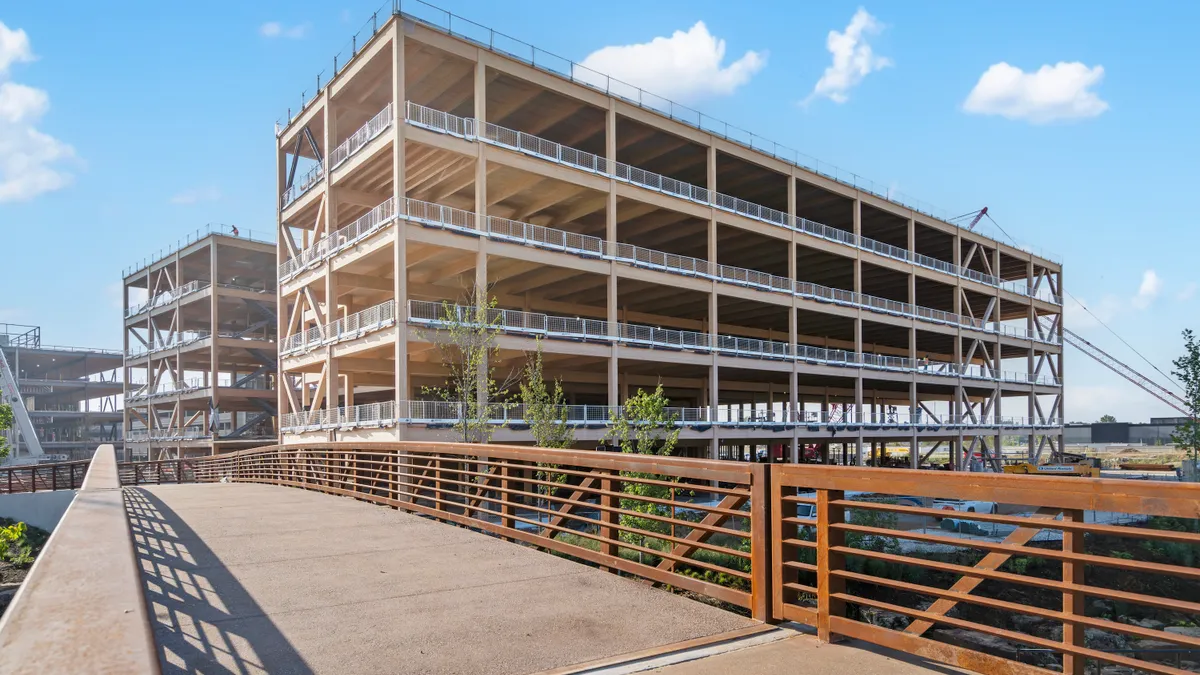Highlights
Tech-driven modular:
Prescient is a technology-powered builder backed by software able to draw up designs for modular buildings and transfer them to manufacturing robotics that weld components for structures up to 18 stories tall.
Triple the square footage:
From 2013-2015, Prescient’s average project was less than 60,000 square feet and three to six stories. Since 2016, that figure has nearly tripled, with the company’s average project size hitting the 200,000-square-foot mark.
Outlook:
Adding to its two U.S. manufacturing centers in North Carolina and Colorado, Prescient will build plants in Nevada and Texas next and get serious about overseas expansions of factories and personnel.
Offsite construction is poised for explosive growth, and Prescient is well-positioned to take advantage of the delivery method’s popularity. The BIM hardware and software technology company, which strategically decided to focus on multifamily units up to 18 stories, marries the digital and built worlds with software that captures structural and engineering details for plans that are used on site.
Prescient transforms those details into 3D virtual models early in the prefabrication design process. Its software automatically plugs in the architect’s design and communicates architectural schematics to manufacturing robots, which form and weld parts that are fitted with QR codes to streamline identification and sequencing through subsequent production phases.
“You don’t hear much about us. We’re the quiet company attacking the industry through collaboration and adoption and building a brand franchise second to none," executive chairman Satyen Patel told Construction Dive. "We see ourselves as a quiet disruptor."
The company, which civil engineers Michael Lastowski and John Vanker founded in 2012, is raising capital — most recently closing $50 million of Series E funding earlier this year, bringing its valuation to $650 million — to continue its impressive growth. Although statistics show the majority of companies get acquired at this point in funding, Prescient told Construction Dive it is still keeping all options open.
The company sees big growth opportunities in multifamily apartments, student housing, senior living, hotels, workforce housing and armed forces housing. Prescient won a two-stage 2-million-square-foot contract in California earlier this year — a figure that alone exceeds all of its 2017 production, and which is a large part of why the company is on track to more than double its year-over-year production. In 2016 and 2017 combined, the company built 2.7 million square feet. This year, it has delivered or is in the process of building another 3.6 million square feet.
All told, the company is quickly approaching the 10 million square feet mark, taking into account its already-built numbers (5.1 million square feet) and its in-development figure (4.7 million square feet).
In addition to its domestic expansion, Patel said the company also is discussing franchising opportunities across the U.S., North America and even Europe and Asia.
“Our digital thread allows us to control the design development aspect of the Prescient technology globally through a centralized hub while franchising the manufacturing, installation and completion of the finished buildings in each international market, country by country,” Patel said. He believes Prescient’s process and resulting time and cost efficiencies “will set the new standard for how projects are planned, designed and built. It’s our company’s mission to revolutionize the building environment.”
With greater operating capacity and more facilities comes employee growth. Prescient has 339 employees, 167 of whom were added in the past year across all company functions. The firm has ambitious hiring plans for next year in every aspect of its operations.
Although modularization often conjures up visions of cookie-cutter buildings, Prescient’s model is anything but. CEO Magued Eldaief told Construction Dive earlier this year that Prescient's "standardization" refers to the process, not the buildings. “While standardization unlocks the speed, efficiency and precision of manufacturing processes, these processes still yield diverse and unique final products."
Patel says Prescient is “bringing the digital world to the physical world. Over the past six years, we’ve been quietly developing our technology, our 75-patent portfolio across 30 countries with 64 more patents on file, our products, our manufacturing capacity and over 5 million square feet of finished buildings, 32 of which are finished across 16 states, with another 18 in progress. And we’ve only just begun.”
And the timing really couldn’t be better. Patel says the one thing most everyone in construction agrees on is that the next five years will bring about more change than the past 50 years combined.
“We’re poised to take advantage of that change,” he said, citing how automation and digitalization could help solve issues such as the pressing labor shortage. “But we’re not resting on our laurels because the worst thing you can do is become complacent; that’s when the rest of the pack will catch up. We’re staying one step ahead by constantly innovating.”
Some of Prescient’s most recent innovations involve manufacturing and installing stairs, building and inserting metal flooring and installing external sheathing to create a dry-in environment earlier in the process, said Patel. “For us, ongoing innovation delivery is a way of life.”
Read More
-
Q&A: Prescient CEO on how tech is advancing prefab construction
By Laurie Cowin • Feb. 14, 2018 -
Prescient eyes 10M square feet, expansion to most 'NFL cities'
By Kathleen Brown • Oct. 31, 2018 -
Digital Deals: AECOM, Prescient, PCL, DroneDeploy, more
By Construction Dive Editors • July 25, 2018 -
Balfour Beatty tapped to manage Atlanta prefab tower project
By Kim Slowey • Oct. 17, 2018



















